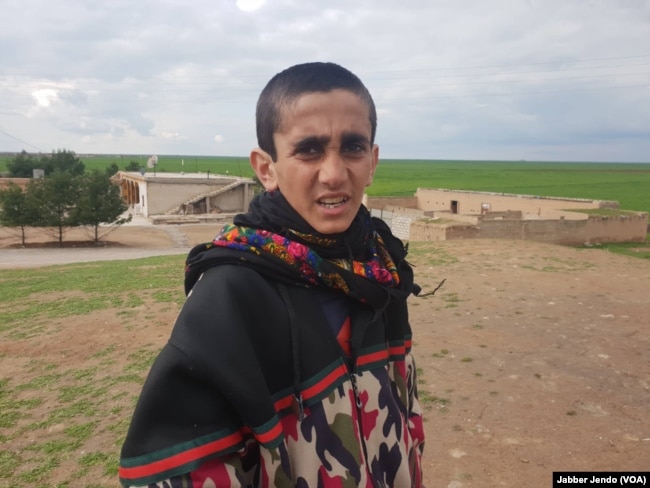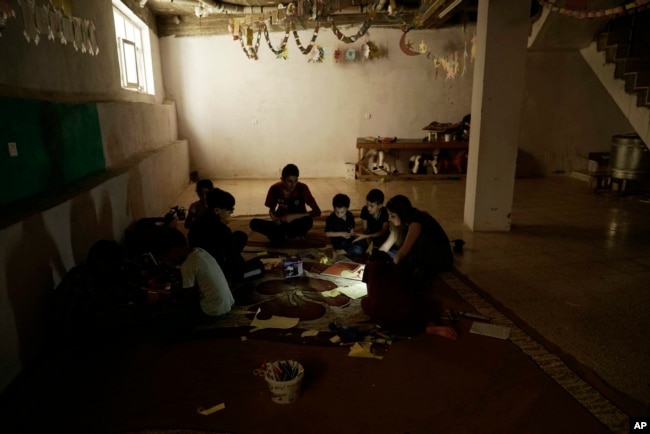U.S.-backed Syrian forces battling Islamic State militants in their last hideout in eastern Syria said they have rescued dozens of Yazidi children held by the militant group for years, VOA news reports.
Syrian Democratic Forces (SDF), a Kurdish-led alliance, said last week that they had successfully freed more than a dozen Yazidi children from IS as they evacuated civilians from the Syrian town of Baghuz.
“Among many children saved from [IS] territory today, a group of Yazidi children also arrived to safe areas,” SDF spokesman Mustafa Bali said in a tweet.
Yazidis, a Kurdish-speaking religious minority, are viewed as infidels by IS extremists.
In August 2014, IS militants made a massive attack on Sinjar, once home to the largest Yazidi community in the world. At least 5,000 Yazidis, mostly men and boys, were killed during the attack on the Iraqi city.
Sex slaves, soldiers
IS then kidnapped thousands of Yazidi children and women, who were subsequently used as sex slaves and child soldiers.
The 12 children recently freed by IS in Baghuz are now in a special residence near Hasaka, a Kurdish-held area in northeast Syria.
“I was held for more than four years,” said Mazin Salim, 14, a former captive.
“When they first took me from my village [near Sinjar], they kept me in Mosul for several weeks,” he told VOA in a phone interview this week.
Salim added that “along with many other Yazidi children, I was then taken to a location in Syria. I believe it was Aleppo. After staying there for a few months, they transferred us to Raqqa.”
Raqqa, the de facto capital of IS, was liberated by the SDF with support from the U.S.-led coalition in October 2017.
“When fighting intensified in Raqqa, they moved us to an area near Baghuz,” Salim said.
The Yazidi teenager said that while he was in custody, IS indoctrinated him with its extremist ideology.
“In the beginning, they would beat me every day because I didn’t know Arabic and didn’t know anything about Islam,” Salim explained. “But slowly, they taught me how to read verses from the Quran.”
‘Cubs of the Caliphate’
During its brutal reign in Syria and Iraq, IS recruited child soldiers to be part of what it called “Cubs of the Caliphate,” a unit made up of brainwashed and abused children who would carry out suicide attacks, execute civilians and perform other cruel acts.
“I checked up on all of these children,” said Shahin Hossein, a Kurdish doctor who has been providing medical care to the Yazidi children since their arrival. “All of them have varying degrees of psychological problems.”
Hossein said some of the children have been suffering from physical illnesses for a long time without receiving any treatment.
Since the battle to capture Baghuz began this month, it has been easier for SDF fighters to find Yazidi children and women.
“Before this final battle in Baghuz, we had contacts in Daesh territory who would provide us with information about Yazidi captives,” SDF spokesman Bali told VOA, using an Arabic word for IS. “So, we would carry out special operations to rescue them. But since all civilians are leaving Baghuz, it is easier to identify Yazidis as they come out of the town.”
Once they are identified, Yazidi children and women are taken to a different location, separate from camps hosting other civilians fleeing IS.
“Our job is to receive them, give them medical treatment and then facilitate their return to Sinjar,” said Mahmoud Resho, a coordinator at the Yazidi House Council, a local organization that supports Yazidi refugees and captives.
“So far, we have a total of 25 children and a woman who are waiting to go to their families in Sinjar,” Resho told VOA.
A child who refused to be named for security reasons said that he was able to communicate with his family in Sinjar through the Yazidi House Council and that “he can’t wait to see them again.”
Resho said the Iraqi government has recently closed its border with Syria. “That’s why these people have been waiting for a while,” he added.
Uncertainty about families
Another problem facing Yazidi children rescued from IS in Syria is that many don’t know the whereabouts or statuses of their families, Resho said.
“These kids have been kidnapped for almost five years. Some of their families are either killed or have migrated to Europe,” he said.
Salim said he doesn’t know what awaits him in Sinjar.
“I miss my family so much, but I don’t know whether they’re alive or dead,” he said.


